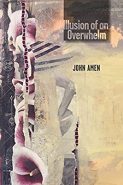
Book Review: Illusion of an Overwhelm by John Amen
Reviewed by George Drew

Illusion of an Overwhelm
Poems by John Amen
NYQ BOOKS, April 2017
$15.83; 72 pp.
ISBN-13: 978-1630450489
In “Hallelujah Anima,” the first section of Illusion of an Overwhelm, John Amen writes, “Some say there’s no such thing as rehearsal,/ I say that’s all there is.” These two lines are the philosophical locus of Amen’s collection. Every theme considered—loss, identity, time, meaninglessness, madness, redemption, reality—is done so through the prism of this theatrically metaphoric stance. And that ongoing rehearsal by a gallery of voices—losers, abusers, aesthetes, poets, aesthetic con men—expressing themselves with what Amen, in the second section, “The American Myths,” terms the “racket of the Alphabet,” we might well call a babble of argot: an olio of language that includes everything from traditional American colloquial speech to idioms of the commercial to scientific terminology to digitized computer and social media newspeak.
Illusion of an Overwhelm is a masterly exploration of quantum consciousness, the microcosmic inner workings of the modern heart and mind. Its four sequences delineate a contemporary psyche mostly hemmed in by its own limitations and adrift in a universe that is unpredictable, non-linear and rife with very dark matter and black holes: “Did it strike you we were simply phenomena flirting/ with gravity, colliding & colliding in the atmosphere?” Things are never what they seem. Space-time, itself an illusion of overwhelm, is relative, confusing, and a deconstruction of meaning. In such a universe of matter/ anti-matter, all any respectable anti-hero can do is “wince & wander, succumb & evade,” and as much as possible persevere, recognizing that “Most of {his} life is a distraction.” In Amen’s world Vladimir and Estragon would not be waiting for Godot. Unlike them, his characters know there is no Godot to bother waiting for. They would simply move on, or back, or not at all.
Bleak, yes—but in a universe in which the “persistent fear is that everything you know/is made of fog, in the terrifying reality/ unreality of such a universe, there is still hope/anti-hope, that most redemptive human duality, that is inherent in the equivalent human capacity for honesty, even courage. J, the narrative, and not-so-narrative, voice in the second section, says that he is the “black son on a bare stage, middle finger to the sky.” There is always that, the universal symbol of disdain; there is always No. Honesty is a necessary courage, especially in a disinterested and amoral universe. Honesty implies belief—belief that if we stare unblinkingly into the abyss of our own hearts and psyches we somehow will find “everything we need to move forward.” Or, as the “black son” says,
If there’s one talent I have
it’s an ability to convince myself I’m on a winning streak
while waiting for the next load of dirt to land,
ringing a bell in the darkness
after the grievers have gone.
Confronted with the complex dualities that Illusion of an Overwhelm presents, one might conclude, “Now, that’s bizarre!” And that reader would be correct. Following the amped up, Beckett-like dislocations of Amen’s last collection, strange theater, it is bizarre. Encountering the odd, alienated characters in the third section, “My Gallery Days,” makes that conclusion abundantly clear and valid. But—and here is the salient point about Amen’s work—it is intentionally so. In precisely its unsparing, head-on grappling with the strangeness of our modern, twenty-first century constructs both outward and inward; with its wrestling with the awe- and nausea-inducing “realities” of an ever-expanding universe; and with its open admission of our own limitations of perception—in these is reflected that necessary courage, that honesty, Amen so amply demonstrates in his poetry. The courage of being. The refusal to back down. The forging of a transformative art. As Amen metaphorically says, “Don’t worry about the black moccasin,/don’t worry about the fire screaming across the water.” All we have to do, all we can do, is keep moving—physically of course, but metaphysically, too. As the speaker in section four, “Portrait of Us,” asks: “Can life be said to exist/that can’t reflect upon itself?”
Surely, John Amen has rendered that question moot. Maybe “no angel” can “forgive its fall,” but we can, we must, forgive ourselves. Reflect, move, and as we do, we can be sure Amen, like Charon, is there beside us, manning the oar, making certain our “overwhelm” truly is an illusion.
George Drew is the author of The View from Jackass Hill, 2010 winner of the X. J. Kennedy Poetry Prize, from Texas Review Press, which also published Down & Dirty (2015), and his New & Selected, Pastoral Habits, in 2016. His eighth collection, Fancy’s Orphan, is due out in 2017, from Tiger Bark Press. He is the winner of the 2014 St. Petersburg Review poetry contest, the 2016 The New Guard’s Knightville Poetry Contest, and is First Runner Up for the 2017 Chautauqua Literary Journal’s Editors Choice Award, his poem forthcoming in this year’s issue.

Leave a Reply